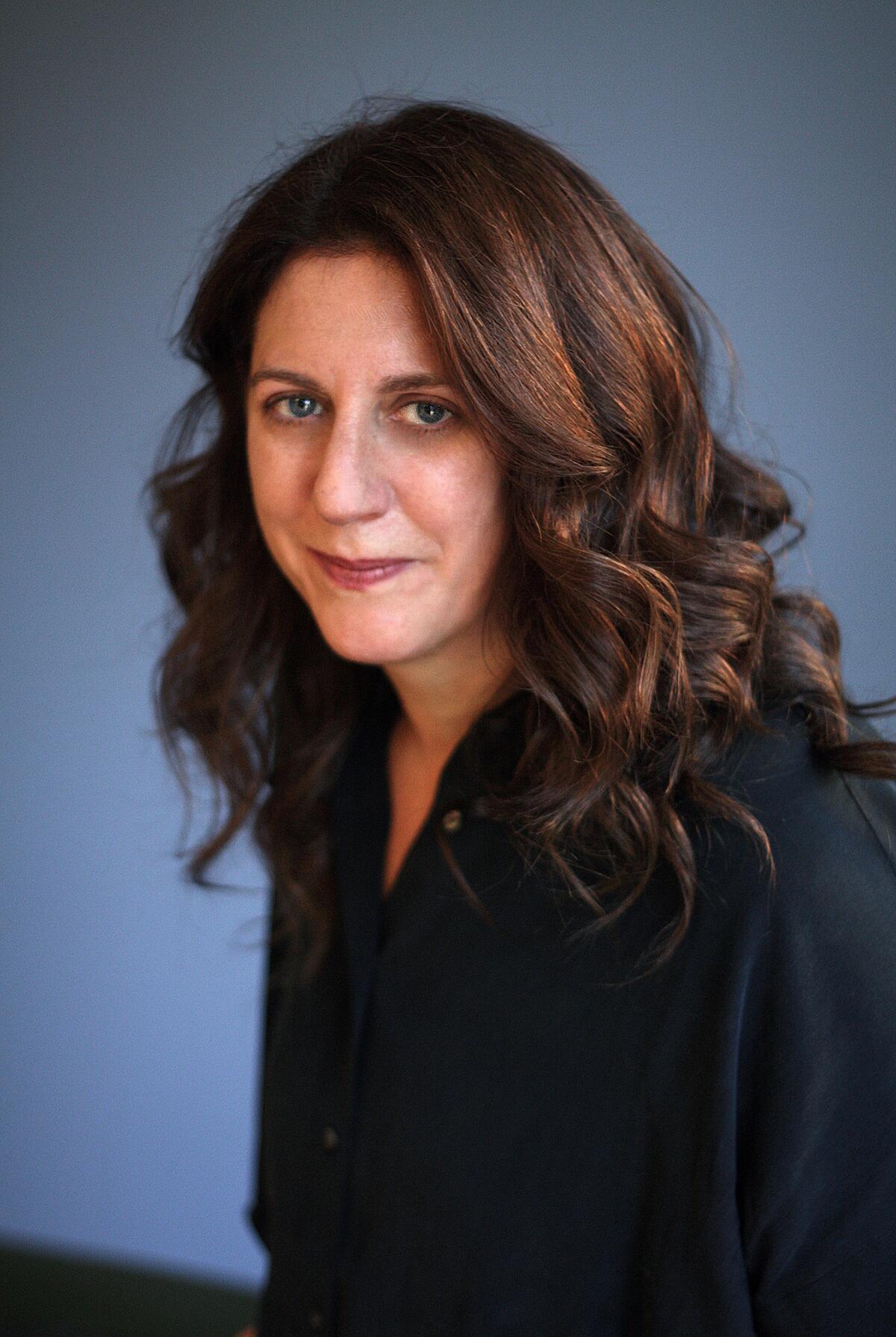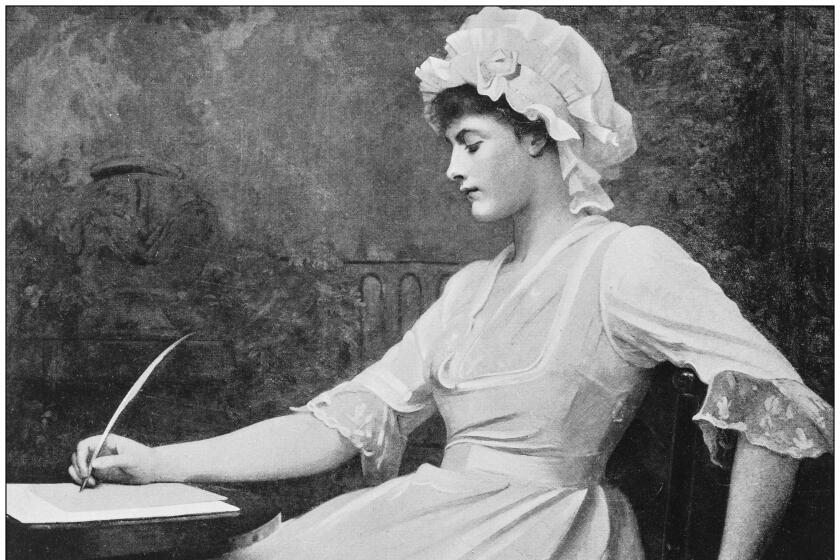Marcy Dermansky whips up the perfect storm of an unreliable narrator in ‘Hurricane Girl’

- Share via
On the Shelf
Hurricane Girl
By Marcy Dermansky
Knopf: 240 pages, $26
If you buy books linked on our site, The Times may earn a commission from Bookshop.org, whose fees support independent bookstores.
Marcy Dermansky specializes in female characters behaving badly. Her second novel, about a feckless nanny, is titled “Bad Marie.” From the sisters who get tattoos in her debut, “Twins,” to the on-the-road protagonist of “The Red Car” and the mother-daughter rivals in 2019’s “Very Nice,” Dermansky allows women to choose their own paths, even when those paths lead to dark and difficult places.
“Hurricane Girl” might sound like another cheeky title, and in a sense it does refer to the troubled protagonist. But there is an actual hurricane. Allison has just left Los Angeles and her life there as a screenwriter to live on the North Carolina coast when a hurricane blows the roof off her new home.
Things deteriorate quickly from there, with Allison making some terrible choices while in shock, ultimately driving north to her mother’s house in New Jersey with an actual hole in her head. The cranial injury doubles down on the novel’s key literary device, an unreliable narrator — in this case, one whose version of events is beguilingly believable. Dermansky tells the story in close third person, meaning the reader remains as ignorant as Allison about her injuries until someone says, “That explains the glass in her hair,” and we realize there is glass inside her brain too.
When Allison next awakes, she’s looking into the eyes of her college friend Danny Yang, now Dr. Daniel Yang, a brain surgeon whose ministrations saved her life — not that Allison understands it that way. “So you did not require my consent? You thought it was okay to operate without my consent,” she says, as he reminds her that “hospital policy” requires him to do just that.
Bethanne Patrick’s June highlights include Tom Perrotta’s ‘Election’ sequel, essential new war histories and a fresh look at females of all species.
Dr. Yang, brilliant and kind and still smitten with Allison, does more than oversee her in-hospital recovery. Before you can say “rebound,” Danny has invited Allison to stay in his Fort Lee high-rise with a rooftop pool, a drawer full of takeout menus and access to his credit card.
“You love to swim,” says Allison’s mother, and in dives Allison, day after day after day. Swim, make love, sleep, repeat. Allison can’t stop touching her newly shorn head, inching toward the incision over the hole in her skull. In case you’re wondering: Small holes in the skull can heal, but larger ones don’t.

Pay attention: There are wounds from which some of us never recover. We wanted to believe that Allison, after being slammed in the head with a heavy glass vase, still “had her health.” As her dreamy days pass at Yang’s apartment tower, we want to believe Allison is healing well and deeply. We know she’s having memory problems. We know she’s not comfortable with either her recent past or her family history, especially with her older brother. (“She had had an uncomfortable conversation with her brother after his wedding, learning that she had not fulfilled her bridesmaid’s duties properly. Allison had never wanted to be a bridesmaid.”)
Like all of Dermansky’s characters, Allison has issues both conscious and unconscious. But the central issue really is all in her head, and it takes a while for her to come to terms with a loss of agency — first from an act of nature and second from an act by a man (the wielder of the vase). That loss burns steadily in Allison’s new consciousness.
Novelist Lynn Steger Strong on the revolutionary passivity of Rachel Cusk, Ottessa Moshfegh and Sally Rooney — how we’ve misread them and what comes next.
Mostly, though, Allison just wants to swim; her daily, obsessive sessions in the water resemble nothing so much as a calm before a storm. But if you think all that swimming will bring Allison “back to life” in the sense of beginning to lead a normative existence, you’ll be wrong. If you really listen to Allison, her actual desires come through clearly. She wanted to live a quiet life in her own house. She wants not to be married, not to be caught in the cycles of her paired-up friends. She wants to be cared for — but on her own terms.
Allison also wants something else, something that may or may not shock you, depending on how closely you’ve been listening. Even the most unreliable of narrators leave clues in their wake. Dermansky frequently contrasts Allison’s deliberative behaviors, like taking steps to brush her teeth or get a turkey sandwich, with her impulsive acts, which include entering a stranger’s house, driving hundreds of miles while concussed, moving into Danny’s place without giving her family any updates on her whereabouts.
Allison, a stranger now to herself, cannot reconcile her before and after, cannot live with these consequences, and no wonder: She may have made some bad choices, but the person who hurt her made worse ones. The book’s denouement may be less surprising than its finale, but it’s no less deliberate than Allison’s tooth-cleaning process. “But, she told herself, the trip to her old house had been a success. She was, for instance, not dead.”
In “Hurricane Girl,” Dermansky brings a woman back to life as the sun emerges from the clouds. Allison’s choices may have seemed baffling, but in the end, her existence at last belongs only to her. It might be too early in the author’s career to say she believes her characters can only make bad choices. But in Allison, she has found one capable of breaking through stale scenarios like a powerful, cleansing storm.
Patrick is a freelance critic who tweets @TheBookMaven.
More to Read
Sign up for our Book Club newsletter
Get the latest news, events and more from the Los Angeles Times Book Club, and help us get L.A. reading and talking.
You may occasionally receive promotional content from the Los Angeles Times.












